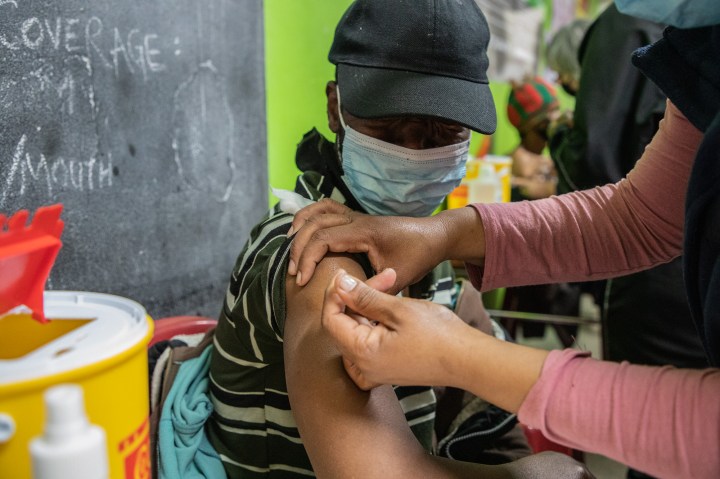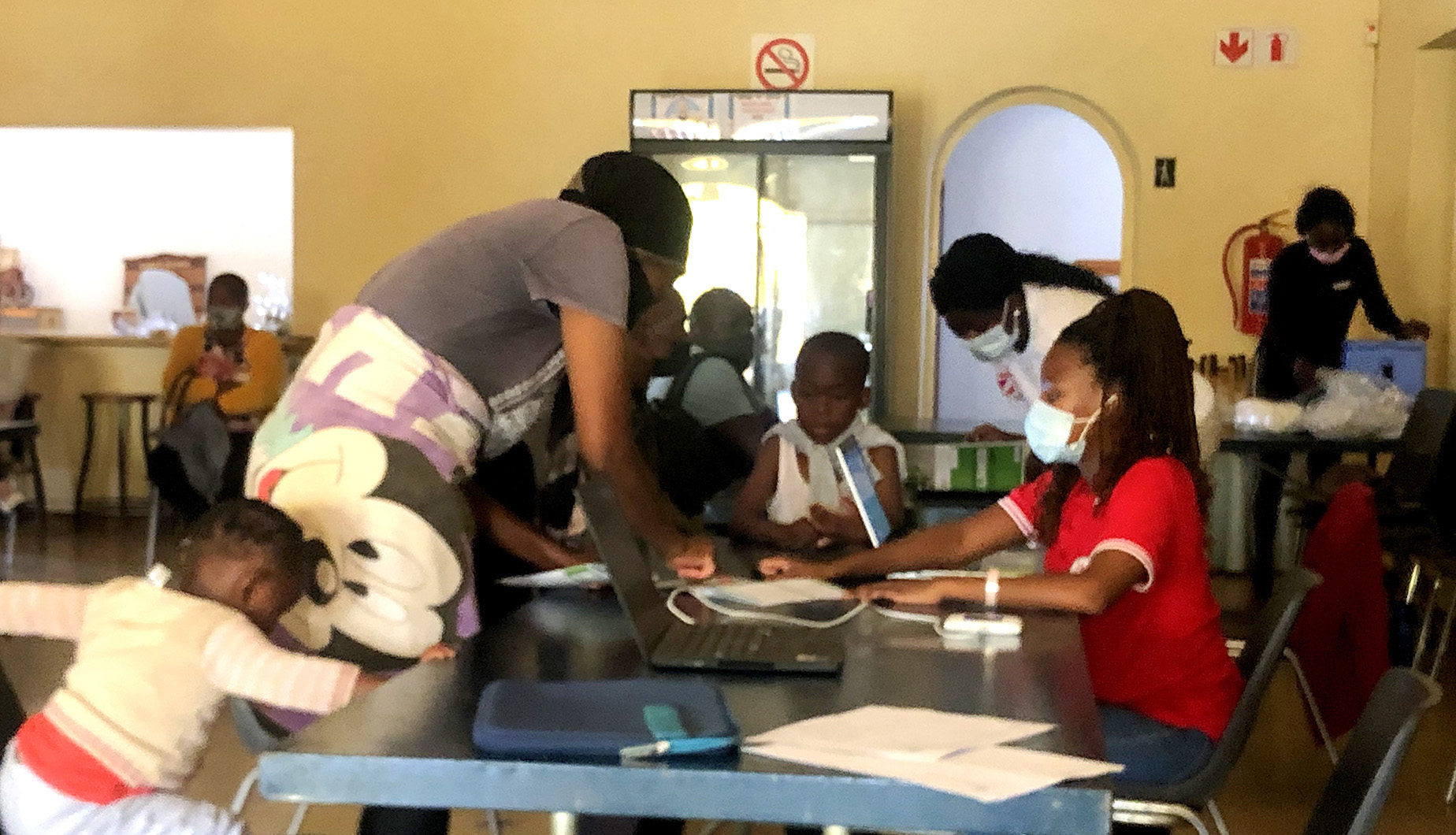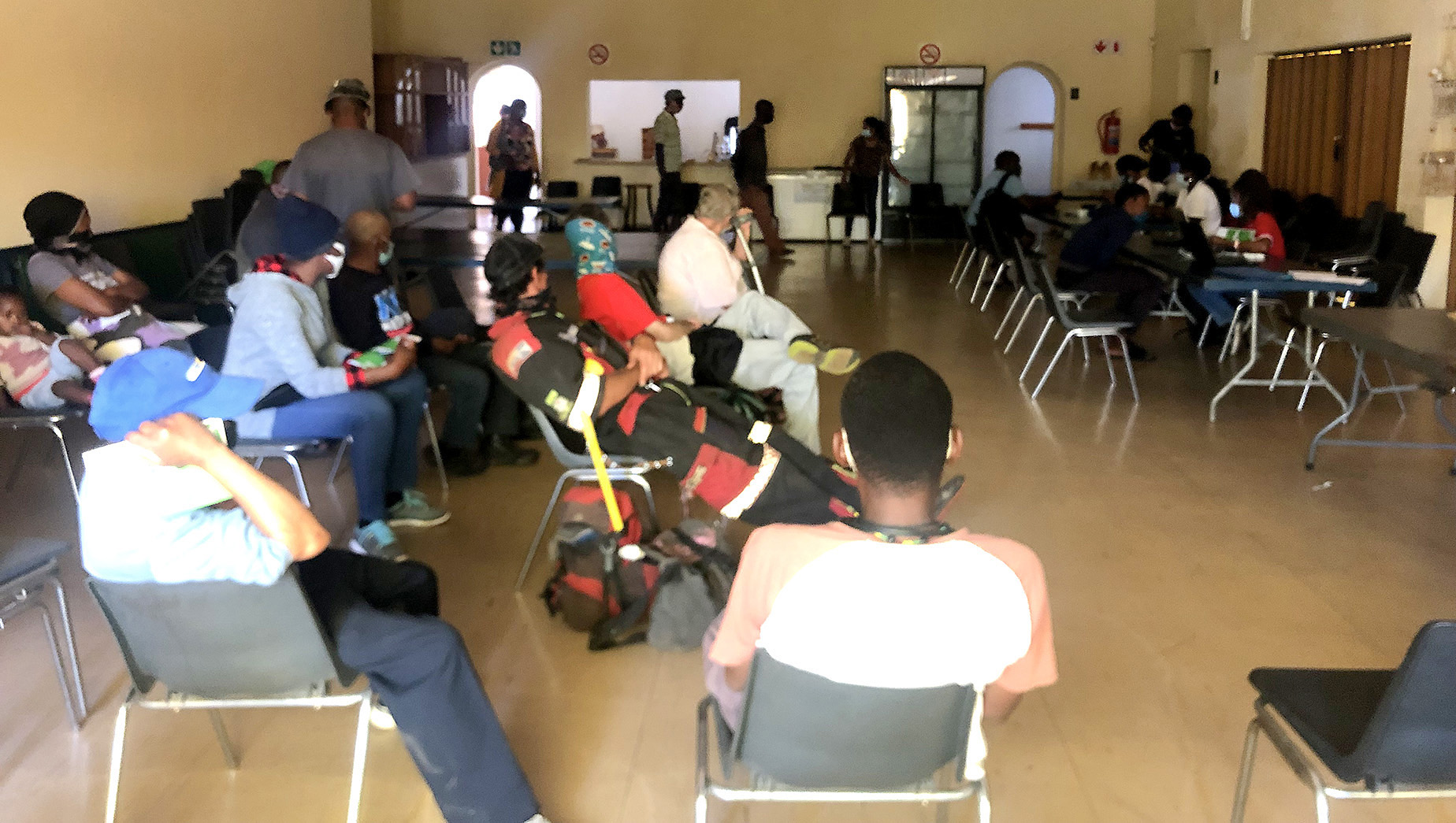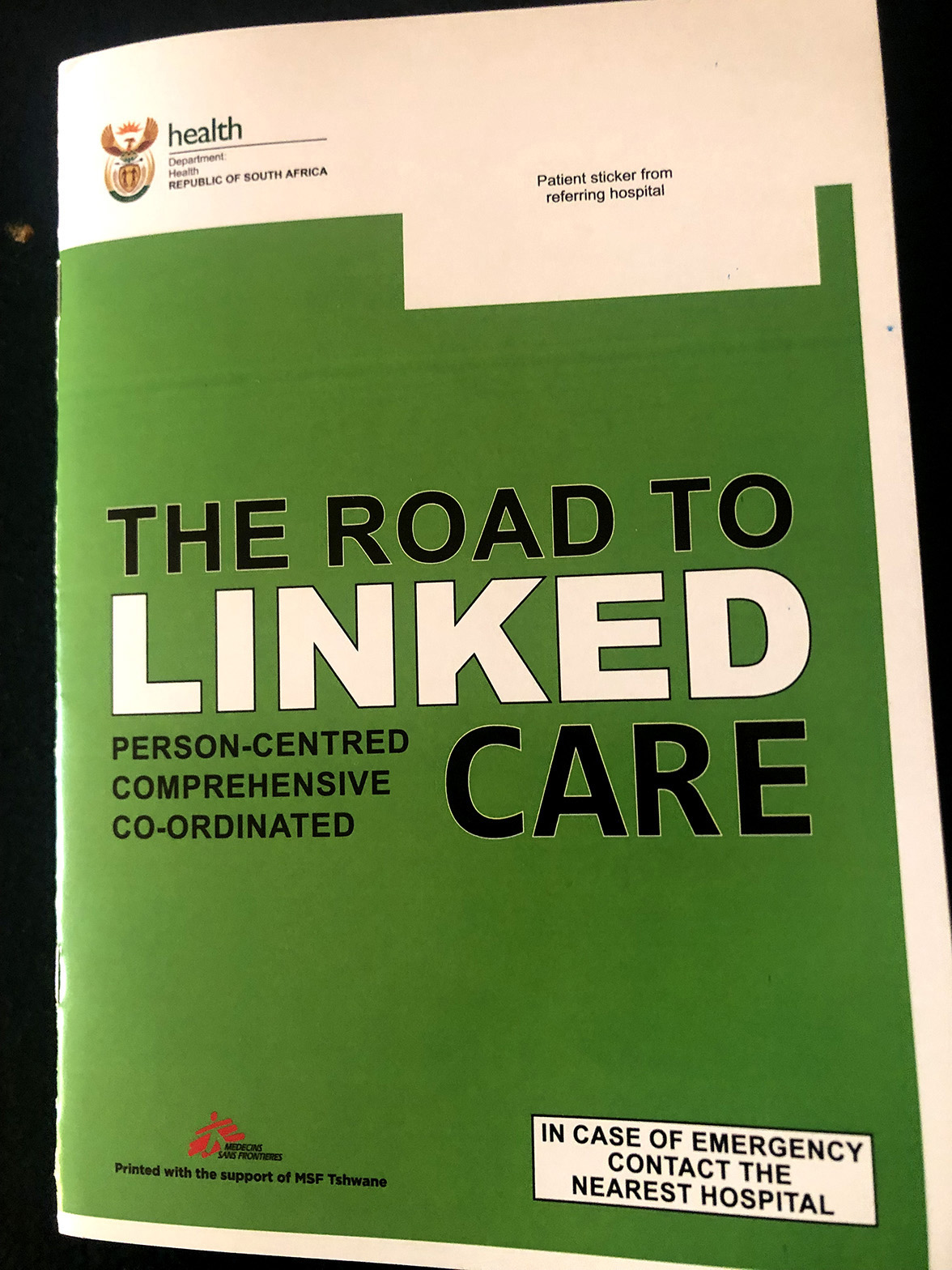Desperate for a vaccine
Still no national plan to ensure access to vaccines for ‘the undocumented’

Despite promises to date, there is still no national system to systematically vaccinate those without ID numbers or to take ‘pop-up’ vaccination sites to people who find it difficult to access the health system. In the midst of talk about vaccine mandates, there are millions of people who can’t get vaccinated even if they want it. This is a huge hole in the vaccination programme.
In February 2021 President Ramaphosa announced that everybody in South Africa would have the right to a Covid-19 vaccination, including people who are foreign migrants or who do not have IDs (often called ‘the undocumented’). At the time, this step was lauded by civil society and the UN High Commission on Refugees (UNHCR). But it took until October 2021 for this to be turned into a policy decision.
However, to date, there is still no national system to systematically vaccinate the undocumented or to take ‘pop-up’ vaccination sites to people who find it difficult to access the health system.

Covid-19 vaccinations were made available to homeless and undocumented people last week at a soup kitchen in a church in Newlands, Johannesburg. (Photo: Mark Heywood)
The problem, we were told by the National Department of Health (NDoH), is that if a person doesn’t have an ID he/she can’t be entered on the EVDS and therefore can’t be vaccinated. But given what the Ministry of Health should know of South Africa’s population profile, and given the constitutional right of “everyone” in SA to have access to health care services and the interests of public health, one would have thought that the NDoH and the Vaccine Ministerial Advisory Committee would have planned for this long ago.
It is not a small problem after all.
Lawyers for Human Rights (LHR) say there are just over 15 million people in SA who are unregistered or undocumented, three million of them children. LHR also points to a court case on the rights of children without IDs to education where it was accepted that there are an estimated 900,000 undocumented children in schools, 800,000 of them South Africans.
15 million may seem improbable, but even if it’s half that number, it’s still a lot of people needing vaccination. In response to questions, Siya Qoza, spokesperson for the Minister of Home Affairs, told us that “Unfortunately the Department of Home Affairs does not keep statistics of South Africans who have no IDs but rather, it keeps statistics of people who have been issued with IDs or birth certificates. This is because we depend solely on people who require such documents approaching our offices.”
Qoza provided detailed statistics of the numbers of IDs issued per year in the last decade, amounting to over 27.5 million IDs.
“On average the Department issues three million ID documents a year but last year only 1.3 million were issued due to Covid-19 restrictions.”
Qoza’s response to Maverick Citizen concluded:

Covid-19 vaccinations at a soup kitchen in a church in Newlands, Johannesburg. (Photo: Mark Heywood)
“As the Department of Home Affairs, we do not think a lack of an ID is an impediment from receiving life-saving vaccination, unless the Department of Health states so. We are aware that in some instance homeless people and undocumented foreign nationals were assisted to vaccinate.”
Qoza is right. Our investigation shows “some” people have been assisted — but they are a drop in a large ocean.
For example, it is estimated that in Johannesburg up to 15,000 people live on the streets; and 14,000 in Cape Town. Most don’t have IDs.
There are also tens of thousands of undocumented migrants.
The lack of clear direction from the NDoH has compelled provinces and NGOs to try and develop their own plans.
For example, while awaiting national guidelines and “in the absence of an NDoH process” the Western Cape Health Department issued a circular on 29 July 2021 advising all health facilities that they could commence vaccination of undocumented clients. A sytem was devised using a paper-based registration form, and writing ‘Undocumented’ in the section of the form requiring an ID number.
To date according to the Department, 1,877 undocumented persons have been vaccinated.
Sally Gandar, the Head of Advocacy at the Scalabrini Centre, an organisation that offers support and services to refugees, asylum seekers and migrants, was positive about the approach in the WC telling Maverick Citizen that “we have been told by clients who are undocumented that they have been able to access vaccination sites in Cape Town”.
“Where people have reported difficulties, we’ve had success simply calling the site and explaining the situation.” Gandar says “this may be why there are fewer specific sites dedicated to undocumented or more transient populations, but there are a number of examples where specific sites have been set up for such persons, and we understand that they have been well attended.”
Unequal distribution of vaccine sites
To make things worse, the challenges of getting a vaccine if you don’t have an ID are compounded by an unequal distribution of vaccine sites that favours the employed and those with private transport.
The table below, compiled by the University of Johannesburg’s Centre for Social Change, is indicative of the problem. For example, it shows that in the Randburg/Rosebank area of Johannesburg there are 15.1 sites per 100,000 people, compared to 1.8 in Soweto or 2.5 in Ennerdale/Orange Farm.
| Region | Private sites | Public sites | Total sites | Population (2019) | Residents below lower poverty line (2019) | Sites per 100,000 | % below lower poverty line |
| Johannesburg A (Midrand/Diepsloot) | 33 | 6 | 39 | 879 462 | 267 488 | 4.4 | 30.4 |
| Johannesburg B (Randburg/Rosebank) | 52 | 6 | 58 | 372 485 | 55 717 | 15.1 | 15.0 |
| Johannesburg C (Roodepoort) | 22 | 7 | 29 | 880 873 | 239 897 | 3.2 | 27.2 |
| Johannesburg D (Soweto) | 11 | 11 | 22 | 1 219 886 | 501 813 | 1.8 | 41.1 |
| Johannesburg E (Sandton/Alexandra) | 22 | 10 | 32 | 559 958 | 129 808 | 5.7 | 23.2 |
| Johannesburg F (Inner City/Southern Joburg) | 48 | 8 | 56 | 716 282 | 190 804 | 7.8 | 26.6 |
| Johannesburg G (Deep South/Ennerdale/ Orange Farm) | 9 | 11 | 20 | 800 018 | 374 527 | 2.5 | 46.8 |
Table: Distribution of vaccination sites in Johannesburg by region, showing population and poverty. Sources: Sacoronavirus, Gauteng Health Department, City of Johannesburg. Thanks to Londiwe Sithole for preparing this table. Figures for numbers of sites are for 28 November 2021.
Pilot projects underway in Gauteng and KZN
So far the Western Cape appears to be the only Province that has officially opened its vaccination sites to undocumented people and integrated the undocumented into the system.
However, since October, pilot projects in Gauteng and Durban have been started to try to fill this vacuum.
In Gauteng, it was initiated by the University of Pretoria (UP) with the assistance of the national health department and has since been supported by Medecins Sans Frontieres and civil society organisations such as the Community Working Group (CWG).
According to Prof Deb Basu, head of Public Health and Preventative Medicine at UP, a site was initially set up at the UP medical school but two ‘pop-up’ teams have since been established to visit homeless shelters and people living on the streets of Pretoria as well as informal settlements. So far the team have vaccinated 1,968 people.

People without IDs who are vaccinated receive a basic medical check-up and a Green Book with their details that will permit them further access to care. (Photo: Mark Heywood)
Basu takes pains to explain that the project is not limited to Covid-19 vaccinations, but aims to link people to ongoing health care. People without IDs who are vaccinated receive a basic medical check-up and a Green Book with their details that will permit them further access to care.
After loud requests from civil society organisations in early December, the project was extended to Johannesburg and Ekurhuleni. Sites have recently been set up at the Tembisa hospital and the Hillbrow Community Health Centre (CHC). In Johannesburg a mobile pop-up team last week began visiting locations in the Johannesburg inner city. On Tuesday, the unit set up at a soup kitchen in a church in the Newlands area and vaccinated 38 homeless people from the Alberts Farm Park, undocumented migrants and local residents.
On Thursday, 250 indigent people collecting food parcels from the Norwood, Orange Grove and Houghton (Noah) Community Action Network (Can) were offered vaccinations. Today the team is visiting an informal settlement in Protea South, Soweto, where 250 people have been registered for vaccination.
In Durban, the pilot site has been hosted by the Denis Hurley Centre (DHC), an organisation that provides support to the homeless and foreign migrants. Raymond Perrier, its director, told us that a pop-up site is set up by Durban City Health three days a week, on the street outside the Centre where it is visible to all, thereby allaying some of the fears. It is open at the same time that the DHC provides daily meals to 200 homeless people, but it provides vaccinations to anyone who requests them.
It aims to vaccinate 60 people a day and mostly meets its target.
Last week Maverick Citizen assisted the Johannesburg pilot team. We watched a small but dedicated team made up of a doctor from MSF, a clinical associate and others who tended diligently and respectfully to the community. From what we saw it quickly became apparent that demand will far outstrip supply. The list of requests for pop-up sites grows daily and there is a request that the team operate on weekends when many poor and homeless people cease their weekday hustle and search for piece jobs and recycling.
Perrier confirmed this. Outside of the DHC, there is no other facility in KZN that vaccinates people who are without IDs. He says that in his experience there is little resistance to Covid-19 vaccination, only a hesitancy that is dispelled when people are engaged by people they trust or “given a nudge”.
“In my experience, there are a whole lot of people desperate to get a vaccine — we get calls from Pietermaritzburg and all over the place, asking if people can come to the Centre”, says Perrier.
Based on what we have seen the demand for pop-up sites and their acceptability shows that in poor communities the main problem is access to sites. If the government and Business for South Africa are serious about reaching our vaccination targets, and doing so in a way that doesn’t discriminate against the poor, this is an approach they would do well to take on board and take to scale — quickly. DM/MC
"Information pertaining to Covid-19, vaccines, how to control the spread of the virus and potential treatments is ever-changing. Under the South African Disaster Management Act Regulation 11(5)(c) it is prohibited to publish information through any medium with the intention to deceive people on government measures to address COVID-19. We are therefore disabling the comment section on this article in order to protect both the commenting member and ourselves from potential liability. Should you have additional information that you think we should know, please email [email protected]"





 Become an Insider
Become an Insider